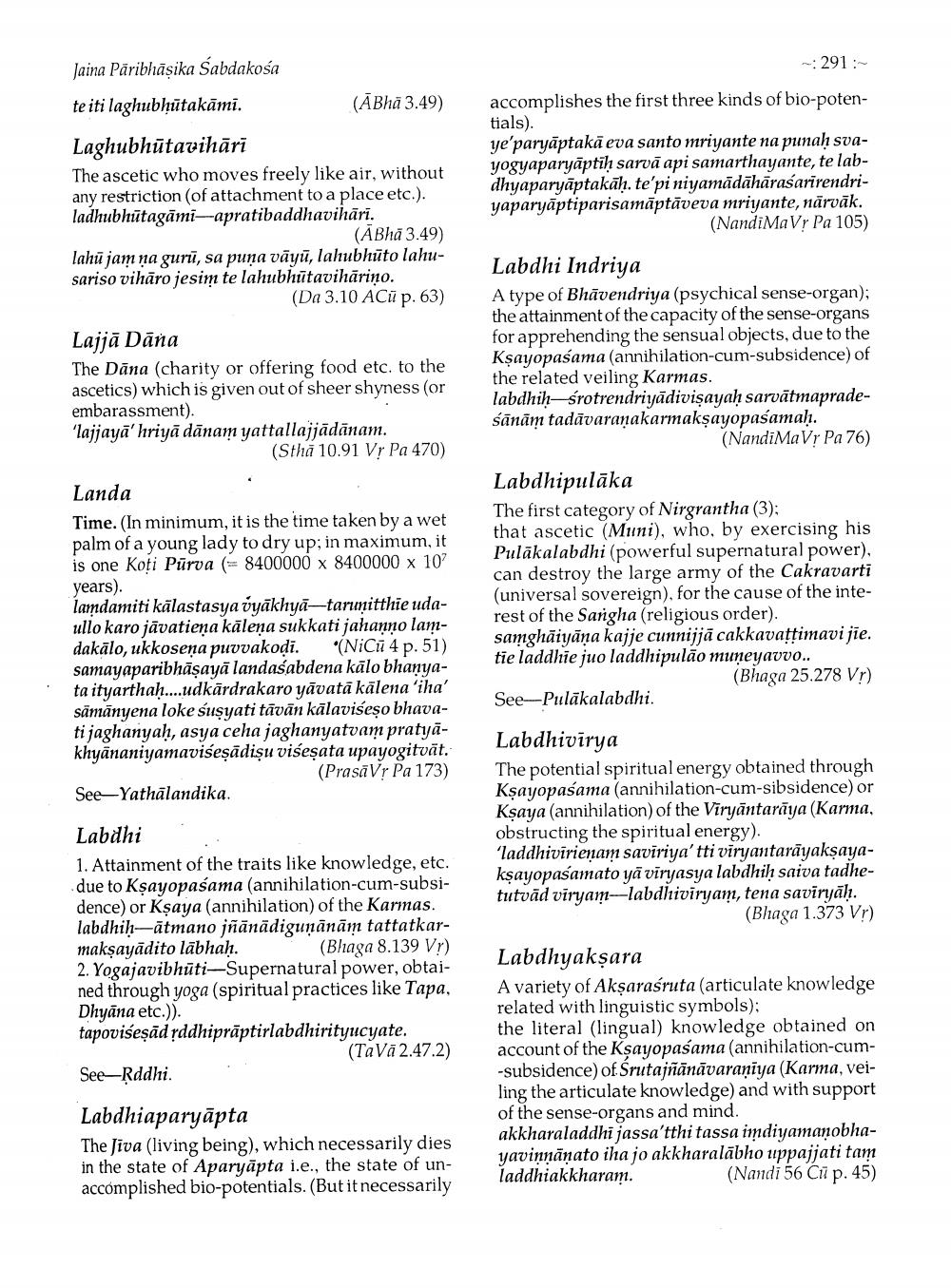________________
-291
Jaina Pāribhāşika Sabdakosa te iti laghubhūtakāmi.
(ĀBhā 3.49)
Laghubhūtavihāri The ascetic who moves freely like air, without any restriction (of attachment to a place etc.). ladhubhūtagāmi-apratibaddhavihāri.
(ABhā 3.49) lahū jam na guru, sa puņa vāyā, lahubhūto lahusariso vihāro jesim te lahubhūtavihārino.
(Da 3.10 ACū p. 63)
accomplishes the first three kinds of bio-potentials). ye'paryāptakā eva santo mriyante na punaḥ svayogyaparyāptiḥ sarvā api samarthayante, te labdhyaparyāptakāḥ. te'pi niyamādāhārasarirendriyaparyāptiparisamāptāveva mriyante, närvāk.
(NandiMaV; Pa 105)
Labdhi Indriya A type of Bhāvendriya (psychical sense-organ); the attainment of the capacity of the sense-organs for apprehending the sensual objects, due to the Kşayopasama (annihilation-cum-subsidence) of the related veiling Karmas. labdhih-śrotrendriyādivişayah sarvātmapradeśānām tadāvaranakarmakşayopasamah.
(NandiMaVPa 76)
Lajjā Dāna The Dāna (charity or offering food etc. to the ascetics) which is given out of sheer shyness (or embarassment). 'lajjayā' hriyā dānam yattallajjādānam.
(Sthā 10.91 Vr Pa 470) Landa Time. (In minimum, it is the time taken by a wet palm of a young lady to dry up; in maximum, it is one Koti Pūrva (= 8400000 x 8400000 x 10 years). lamdamiti kālastasya vyākhyā-tarunitthie udaullo karo jāvatieņa kāleņa sukkati jahanno lamdakālo, ukkosena puvvakodi. "(NiCū 4 p. 51) samayaparibhāṣayā landaśabdena kālo bhanyata ityarthaḥ....udkārdrakaro yāvatā kālena 'iha' sāmānyena loke suşyati tāvān kālaviseşo bhavati jaghanyah, asya ceha jaghanyatvam pratyäkhyānaniyamavišeşādişu višeşata upayogitvät.
(Prasā Vr Pa 173) SeeYathālandika.
Labdhipulāka The first category of Nirgrantha (3); that ascetic (Muni), who, by exercising his Pulākalabdhi (powerful supernatural power), can destroy the large army of the Cakravarti (universal sovereign), for the cause of the interest of the Sangha (religious order). samghāiyāņa kajje cunnijjä сakkavattimavijie. tie laddhie juo laddhipulāo muneyavvo..
(Bhaga 25.278 Vr) See-Pulākalabdhi.
Labdhivīrya The potential spiritual energy obtained through Kșayopasama (annihilation-cum-sibsidence) or Kșaya (annihilation) of the Viryāntarāya (Karma, obstructing the spiritual energy). 'laddhivīrienam savīriya'tti vīryantarāyakşayakşayopasamato yā vīryasya labdhiḥ saiva tadhetutvād vīryam--labdhiviryam, tena saviryāh.
(Bhaga 1.373 Vr)
Labdhi 1. Attainment of the traits like knowledge, etc. due to Kşayopasama (annihilation-cum-subsidence) or Kşaya (annihilation) of the Karmas. labdhih-ātmano jñānādiguņānām tattatkarmakşayādito lābhah.
(Blaga 8.139 Vr) 2. Yogajavibhūti-Supernatural power, obtained through yoga (spiritual practices like Tapa, Dhyāna etc.)). tapovišeşād ddhiprāptirlabdhirityucyate.
(Tavā 2.47.2) See-Rddhi.
Labdhyaksara A variety of Akşaraśruta (articulate knowledge related with linguistic symbols); the literal (lingual) knowledge obtained on account of the Kşayopasama (annihilation-cum-subsidence) of Srutajñānāvaraṇīya (Karma, veiling the articulate knowledge) and with support of the sense-organs and mind. akkharaladdhi jassa'tthi tassa imdiyamanobhayavinnānato iha jo akkharalābho uppajjati tam laddhiakkharam.
(Nandi 56 Cū p. 45)
Labdhiaparyāpta The Jiva (living being), which necessarily dies in the state of Aparyāpta i.e., the state of unaccomplished bio-potentials. (But it necessarily




